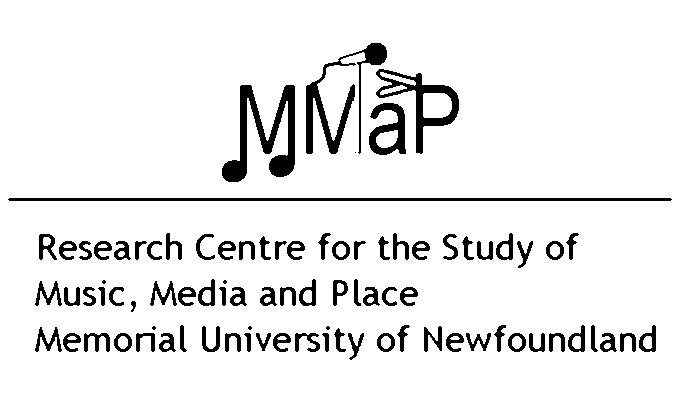
[Note: this article appears on page 1 of the print edition of vol. 1, no. 3 September 2003) of this newsletter]
Research Centre for the Study of Music, Media and Place
by Robin Elliott
In February 2003 the Research Centre for the Study of Music, Media and Place (MMaP) was established at Memorial University of Newfoundland (MUN). The director is Dr. Beverley Diamond, who was appointed on 1 July 2002 to a Canada Research Chair (Tier I) in Traditional Music/Ethnomusicology at MUN. To date she is the only music scholar to have been appointed to one of the prestigious Tier I research chairs. She came to MUN from York University in Toronto where, among other initiatives, she had created the Canadian Musical Pathways Project. MMaP is located in the Annex of the St. John’s Arts and Culture Centre, adjacent to the main MUN campus.
The purpose of MMaP is to act as a bridge between scholars (from MUN and elsewhere) and the traditional music community. The research centre will house a state-of-the-art multimedia studio and audio restoration facility. The initial focus will be on the music of Newfoundland and Labrador, but in future the work may reach out to embrace scholars and musicians from other parts of Canada, and from abroad as well.
The mandate of MMaP is:
- To foster pride in the cultural uniqueness of places and communities, not only by valuing contemporary practices but also by working to make historical materials in the rich regional archives of Atlantic Canada in particular, come alive through extended documentation, multimedia presentation, and scholarly engagement with issues of race, gender, ethnicity, class, and other aspects of collective identity.
- To offer a model for understanding problems of cultural ‘difference’ as articulated in music itself.
- To advocate on issues of intellectual property and access to traditional knowledge.
- To enhance the profile of Canadian music scholars through an aggressive programme of publication.
- To work with educators and community organizations to facilitate the dissemination of cultural materials.
- To enable a deeper understanding of the ways media are invested with meaning by the study of the whole circle from live performance, through mediation, to reception.
- To establish connections between the centre and similar institutions and groups in other jurisdictions, for the exchange of information and ideas.
- To promote international cultural exchange and dialogue.

Back to table of contents for ICM Newsletter, vol. 1, no. 3 (September 2003)
Back to ICM Newsletter, main index
Back to Institute for Canadian Music home page


